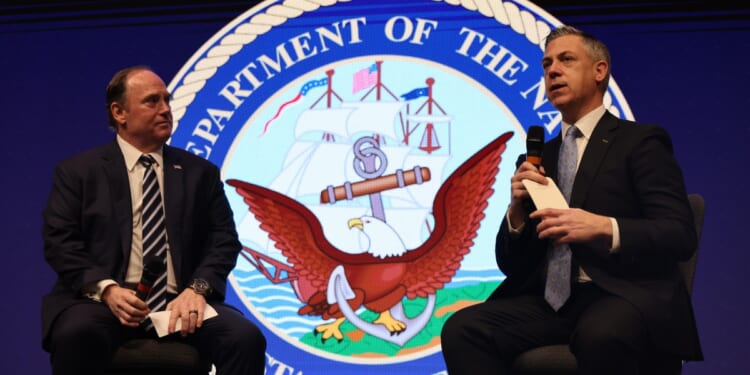The U.S. Navy has reduced its reinstatement time of service members separated for declining a Covid-19 shot from six months to two, Secretary John Phelan told The Federalist Wednesday.
“I think we are pretty far ahead of most of the other services” in fulfilling the Trump administration’s promise to reinstate service members with back pay and erase career penalties for conscientious refusals to accept Covid-19 shots, Phelan said during Q&A at a public event. A War Department official confirmed to The Federalist after business hours Friday evening that the Navy is farther ahead than the other services in reinstating concience-separated soldiers.
The Federalist is pursuing more specifics about the military branches’ fulfillment of President Trump’s executive order 10 months ago promising, “Those who are reinstated will receive their former rank and full back pay with benefits.” Follow-up inquiries to fulfill Phelan’s promise — “I can have someone follow up with you to give you specific numbers” — are pending with military press offices.
Phelan noted he tasked his assistant secretary of manpower and reserve affairs with re-integrating soldiers the Biden administration punished for conscientious objections to Covid shots. That acting assistant secretary, C. Scott Duncan, was himself previously removed from naval command as a lieutenant colonel over his religious objections to the shot mandate.
This reporter broke the news that the Biden administration initially attempted to mandate Covid shots via a press release lacking any legal authority, was among the first to argue against lockdowns, and reported on the Biden administration’s harsh treatment of soldiers whose consciences would not allow them to take medications made from the cells of unborn children whose tissues may have been harvested while they were alive.
U.S. Superpower Status ‘No Longer Guaranteed’
Phelan took questions after speaking at the Northeast Indiana Defense Summit Nov. 12 alongside Indiana U.S. Sen. Jim Banks (R), who hosted the event. Phelan spoke of the dire national security need to revive U.S. manufacturing. Indiana is one of the top manufacturing states.
“We are living through one of the most dangerous strategic environments in modern history,” Phelan told the audience. He highlighted AI, drone, and autonomous machine warfare as intensifying U.S. military needs for tech and strategy advancements. “… Our status as the world’s dominant sea power is increasingly being contested, and it is no longer guaranteed.”
Phelan highlighted his efforts to overhaul a U.S. Navy that is far behind adversarial competitor China in ship quality and quantity while spending billions more than budgeted. China’s dual-use shipyards hold more than half the world’s market share, he noted, putting the United States at a clear naval disadvantage: “We are stuck in 1980s manufacturing in our shipyards and even missile development.”
This, Phelan said, increases the likelihood of war by projecting weakness to foreign adversaries. Drones used on the Ukraine battlefield six months ago, he noted, are already five generations behind what is being used today, meaning military procurement can no longer take years or even months to maintain competitiveness.
Strong National Security Need for Skilled Trades
Offshoring American manufacturing is a top reason for America’s slipping ability to control its ocean borders, Phelan said. During the Cold War, he noted, about one-third of Americans worked in manufacturing. Today, it is approximately 12 percent, and 70 percent of those workers will retire in the next decade.
Meanwhile, the number of U.S. private and public shipyards has halved, he said. The United States now produces less than 1 percent of the world’s commercial ships, while China’s military-commercial shipyards comprise more than 50 percent of world market share.
“For the last decade, we’ve taught people how to code,” he noted. “For the next decade, I believe teaching people how to use their hands will be the most relevant skill needed in the workplace.”
Just to replace the pipefitters, welders, ship fitters, and structural fabricators needed to repair current ships and construct the new ones needed, Phelan noted, requires one-quarter of a million newly trained American workers.
“We need your help to restore the idea that working in the trades is not just honorable, it’s indispensable,” Phelan told the audience. “Because when we talk about national security, we’re really talking about economic security, industrial security, and the dignity of work.”
Recruiting more skilled American labor to efficiently build the ships necessary to control the seas, he said in response to a Federalist question, is at least partly a matter of raising wages.
“When you have workers who make the same money at Buc-ees or at Amazon versus being in a welding outfit all day in very tight corners, it’s hard to get that person to want to do that job,” he told the ballroom audience full of defense contractors. “So we are going to have to adjust wages to be competitive.”
He also noted that the union contracts common to U.S. shipyards restrict workers to fewer tasks. This forces workers to regularly stand around waiting for a person with the right label to come perform a task before the others can proceed, wasting valuable time, work output, and money.
In addition, “We need to get the actual businesses building the ships to invest some of their own capital. I had one CEO of one shipyard complain to me that he had a 109-year-old building and what was I going to do about it? And my response was, ‘Why is that my problem? You have billions of dollars of contracts and you want me to build you a building too? What am I going to get in return?’” Phelan said. “And so we have conditioned things in a bad way, and that company can act that way because they’re one of the few builders that can build this. We need to get competition also into the arena.”
Banks and Phelan noted that President Trump’s Big, Beautiful Bill from earlier this year and this year’s National Defense Authorization Act include tens of billions for building new military equipment inside the United States, particularly in the Midwest.
Hegseth: ‘Those Who Long for Peace Must Prepare for War’
Phelan gave a speech minutes after a morning headliner by Secretary of War Pete Hegseth, who noted that day was the one-year anniversary of his narrow Senate confirmation. He opened by arguing that projecting strength to U.S. enemies prevents war, recalling his first platoon’s motto taken from Ancient Rome, “Those who long for peace must prepare for war.”
“Since waging war is so costly, we owe our republic a military that can win any war we fight,” Hegseth said. “And our adversaries have to believe that we’re willing, capable, and willing to fight and win that war, which is what leads to actual deterrence. That’s peace through strength.”
Phelan and Hegseth both spent much of their speeches discussing their efforts to speed military contracting, where cost overruns, dysfunctional equipment, and delays have become the norm. Hegseth said the decline of the U.S. military he’s working to reverse has increased global threats to Americans.
“This feels like a 1939-type moment or hopefully a 1981-type moment where America needs to lead and rebuild to ensure that we maintain that peace through strength,” he said. “Enemies are gathering and threats are growing. We have to prepare now.”
Hegseth also discussed reorienting military culture towards lethality, which requires cutting bureaucracy and requiring even generals to meet fitness standards, efforts he said the Pentagon opposes: “The Pentagon’s going to fight back. The bureaucracy is going to fight back. The powerful primes will fight back. And it’s our job every hour, every day, every week, every month with our team to return fire, overwhelming fire, and say, ‘No, no, no. This is how we’re changing the paradigm. We’re opening the aperture on speed, on competition, on scale, on commercial first because the warfighters need it and they need it now.’”
Hegseth declined to take media or audience questions, saying in his speech that he has “two basic principles: Don’t talk to the media unless you have to, because all they do is spin, spin, spin. And then just do your job.”
Hegseth received a standing ovation from the veteran-stacked audience when walking in and departing, and robust, spontaneous applause after stating, “No more identity months, no more DEI offices, no more dudes in dresses, no more climate change,” and “I don’t want my son serving alongside troops who are fat and out of shape or in combat units with females who can’t meet the same combat arms physical standards as men in their units. Standards must be uniform, gender-neutral, and high.”















